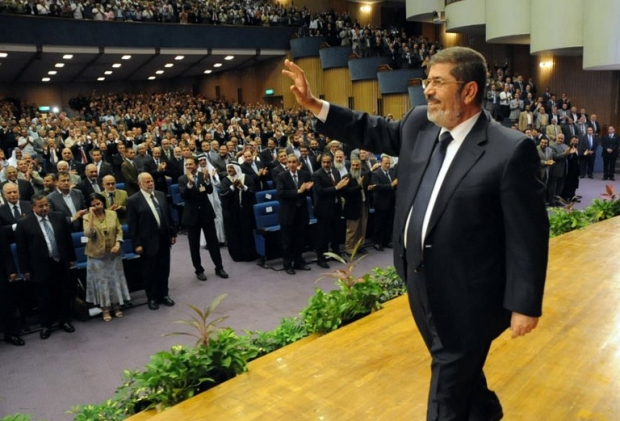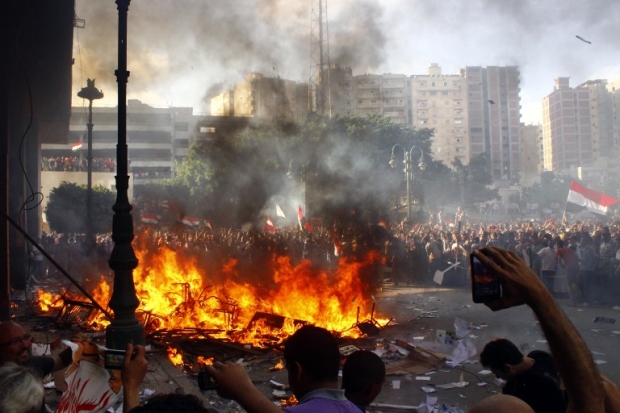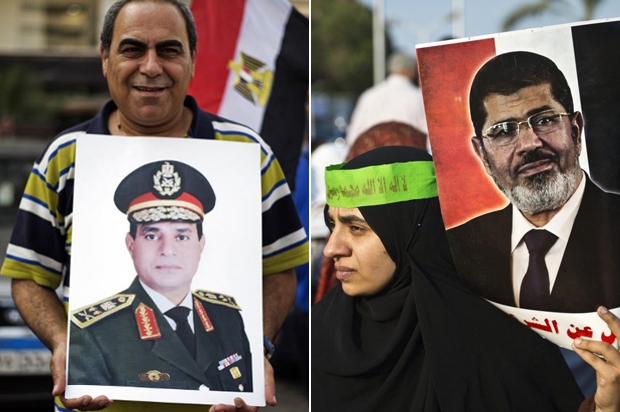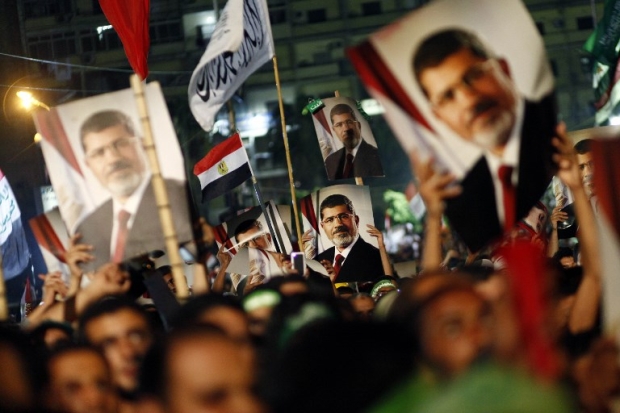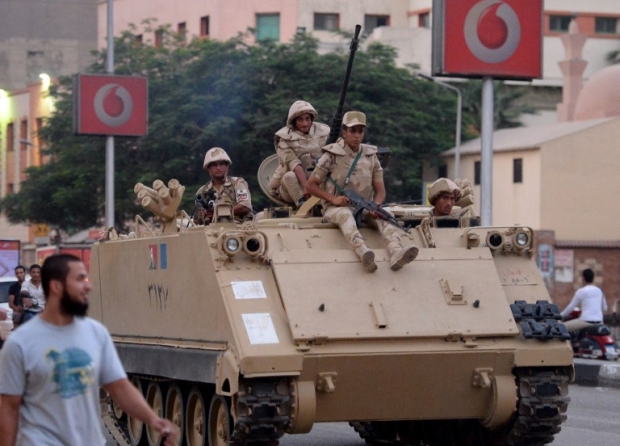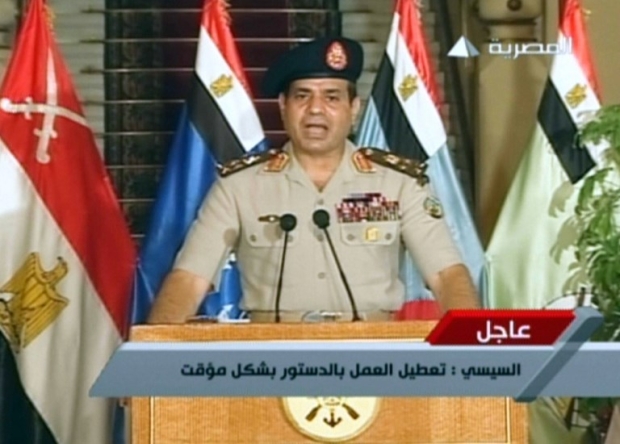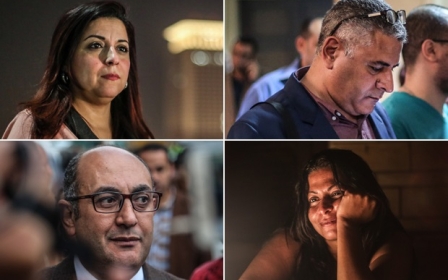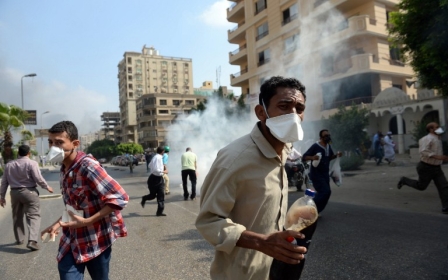Egypt and the coup: Inside the 11 days that toppled Morsi

Editor’s note: On 3 July 2013, Egyptian President Mohamed Morsi was ousted in a coup led by then-General Abdel Fattah el-Sisi. A senior official working for Morsi has spoken for the first time about how events unfolded, asking that his name be withheld due to the sensitivity of the topic. The revelations, which are exclusive to Middle East Eye, include how:
- Sisi had been planning the coup since December 2012
- Morsi was shocked to see the 1 July ultimatum issued by the army on television, even as he was holding a meeting with Sisi
- Presidential advisers believed that a military coup would "never happen in a million years"
- Sisi told Morsi that his reconciliation offer was "more than the opposition demanded"
- The Norwegian ambassador acted as an "unofficial conduit" for the Americans
23 June 2013: Sisi’s warning
One week before the coup, Abdel Fattah el-Sisi, who had been appointed by Morsi as defence minister and head of the armed forces, made an extraordinary speech, warning that the army might have to intervene as anti-government protests and counter-demonstrations rocked the country.
“We are fully responsible for protecting the will of the great Egyptian people," Sisi said. "Those who offend the army would be offending all Egyptians. Whoever thinks that we will remain silent towards any coming assault on the army is mistaken.
“The armed forces have never tried to intervene in public affairs or politics. But I would like to say that we all have a moral, national, and historic responsibility. We will not accept that Egypt enters a dark tunnel of conflict, internal strife, civil war or collapse of state institutions.”
Sisi had met with Mohamed Morsi shortly before the speech but had given no hint of what he was about to say. The previous day, a few hundred protesters had marched to the defence ministry to call on the general to seize power from Morsi.
“In the office, we were more or less confident that at least the army would not intervene. But at the same time, General Sisi’s 23 June speech made it feel naive to go on thinking so,” said the official.
The official believes that Sisi had been plotting the coup for several months. Although few knew it, Sisi had been meeting weekly with opposition leaders every Thursday at the Naval Forces Club in Cairo. These meetings had been taking place ever since the constitutional crisis in December 2012, in which Morsi was accused by opponents of giving himself more powers.
Sisi had presented himself as a neutral mediator between the opposition and Morsi. But by the time Sisi spoke on 23 June he was openly backing the opposition.
“It was extraordinarily in line with the opposition’s positions,” said the official.
At a press conference the previous day, organised under the heading “After Departure”, the opposition coalition, the National Salvation Front (NSF), had called for Morsi’s resignation and for the holding of “early elections”.
23 June: Morsi asked to leave the palace
On the same day, Morsi and his aides were asked by General Mohamed Zaki, the commander of the Republican Guard, which is tasked with protecting the president, to leave the Ittihadiya Presidential Palace and to start working from the Republican Guard's headquarters, a maximum-security military facility in Manshiet al-Tayaran street in Heliopolis, Cairo.
General Zaki would later turn out to be Sisi’s right-hand man in orchestrating the coup.
26-29 June: Turmoil on the streets
The last week of June saw outbreaks of violence around the country, mostly against supporters of Morsi and the Muslim Brotherhood. At least 20 offices of the Brotherhood’s political party nationwide were looted and burned.
On 25 June, the homes of two Brotherhood leaders were set on fire in Morsi’s home governorate of Sharqia in northern Egypt.
Most of the violence started after Morsi’s lengthy speech on 26 June in which he spoke about the challenges he had faced over the previous year and his vision for the future.
"Every revolution has its enemies and every people its competitors. Each nation faces challenges, and we as Egyptians can, God willing, overcome this period," Morsi said.
"There are those who crave the ability to turn back the clock and revert to the state of corruption, oppression, monopolisation and injustice. It seems, unfortunately, that there are those among us who cannot imagine being able to eat or live without it."
From 28 June, rival protests started to assemble in different parts of Cairo. In Heliopolis and Tahrir, the anti-Morsi protesters camped in preparation for 30 June.
'There are those who crave the ability to turn back the clock and revert to the state of corruption, oppression, monopolisation and injustice'
- Mohamed Morsi
Pro-Morsi demonstrators had been gathering since as early as 21 June at a sit-in in Rabaa square.
Morsi supporters were not allowed to protest in Tahrir Square, which had been the crucible of the revolution against Hosni Mubarak in February 2011. For many months, Tahrir and the entire downtown area had been off limits to Morsi’s supporters. This was made possible thanks to the military’s cordoning of the square. Only Morsi’s opponents were allowed to protest in Tahrir.
A number of clashes occurred in Tahrir as young liberal activists, themselves opposed to Morsi, objected to pictures of Mubarak being raised in the square. They had been kicked out of the squares by other protesters.
By 29 June the violence was spreading and getting worse. Offices associated with Morsi’s Freedom and Justice Party (FJP) and the Muslim Brotherhood were attacked by armed gangs chanting against the government.
A young American student in Alexandria, Andrew Pochter, was stabbed to death while filming an opposition protest. At least seven Morsi supporters were also reported killed.
According to the official, the pro-Morsi forces anticipated betrayal by the army and to try to stave it off they staged mass protests in Rabaa and Nahda squares in Cairo. They were urgently trying to express support for Morsi and his legitimacy, hoping the army might be deterred by an expression of popular feeling.
Echoing the Tamarod (Rebellion) movement, which claimed it had collected 22 million signatures in a petition to oust Morsi, the pro-Morsi forces launched a parallel petition called Tagarrod (Impartiality), which claimed to collect a similar number of signatures.
“We listened to these claims, knowing that none of them could be independently verified, but knowing too that the anti-Morsi voices would be amplified in the Western press,” he said.
30 June: Mass protests
On 30 June, Morsi was still at the Republican Guard headquarters. Protesters, however, marched towards the Al-Ittihadiya Palace presidential palace. As they walked, they raised red cards and chanted “Down with Morsi! Down with the MB!”
They were also openly calling on the army to intervene. In one of the marches, a police officer was carried along on a man’s shoulders as though in triumph.
That evening, Essam El Haddad, Morsi’s foreign affairs advisor, met with US Ambassador Anne Paterson. 'Your audience is Sisi, not the people,' she told Haddad
Former US President Barack Obama spoke to Morsi that morning and vaguely encouraged him to make 'bold decisions'. A few hours later, Essam El Haddad, Morsi’s foreign affairs advisor, met with US Ambassador Anne Paterson.
The senior aide, who was briefed about the meeting, said that the message she gave Haddad that night was that no matter how large the protests were, the most important variable was the army.
“Your audience is Sisi, not the people,” she told Haddad. "The Egyptian people tend to forget that what ousted Mubarak was not the people but the military council. Nothing will happen unless the military acts."
He wanted the military to have the upper hand and not to be subordinate to civilians. Sisi was perhaps not the one in control of everything and other members of the military could be pressuring or even threatening him; and uppermost in his mind was the all-important relationship between the army and the US – something they would never want to jeopardise.
According to the official, the army knew the real numbers of protesters on both sides.
“The highest official number we received from the National Security Council was 675,000 protesters nationwide. This was the army’s estimate and was also confirmed by other agencies and by our own scouts,” he explained.
“The pessimists among us felt that the army would intervene only if there were large numbers in the streets. So our perception was that the army would never do anything with these small numbers. And according to official estimates, the number of pro-Morsi protesters was equal or larger than that of opposition protesters.”
Most journalists that day, however, were more interested in covering the anti-Morsi protests. Very few went to Rabaa or Nahda where the pro-Morsi demonstrators gathered. The eyes of the world were on Tahrir and Al-Ittihadiya and the waves of opposition to Morsi.
1 July: Sisi’s ultimatum
Despite the many signs of an impending coup, most presidential officials remained optimistic until the last day. This was mainly because of the reassurance they were getting from Morsi who himself believed that Sisi was still playing the role of mediator.
On the evening of 1 July, Morsi met Sisi in his office at the Republican Guards barracks. At the same time, presidency officials were watching a televised statement by the military as it was broadcast as breaking news.
Despite the many signs of an impending coup, most presidential officials remained optimistic until the last day
It had a picture of Sisi in the background, with the voiceover of another speaker from the army reading a statement that gave all sides of the crisis a 48-hour ultimatum to reach an agreement, failing which, the army would step in to restore order.
Everyone was taken by surprise as Morsi himself did not know about the army’s statement before he went into the meeting. Sisi only told him at the end of the meeting, “but managed to make it sound as though it was not actually an ultimatum,” the official said.
“The same day, the president dressed down General Sisi for this statement, we issued a statement condemning the army’s statement, and the army released a statement backing down from the implication that they would intervene.
“The army really played us by appearing to back down sometimes, negotiate sometimes, offer proposals sometimes.”
2 July: Morsi’s offer
Morsi met with Sisi again on Tuesday 2 July after earlier meeting with representatives of his supporters gathered in Rabaa square. According to Morsi, as he told his senior advisors, he presented to Sisi the initiative that his allies had proposed to him.
That included a full cabinet reshuffle, including appointing a new prime minister, constitutional amendments for all the articles that the opposition disliked, and a reconciliation committee.
Morsi asked Sisi whether this was enough to end the crisis. Sisi replied: “Yes, it is. That’s even more than the opposition demanded.”
This was written down as an agreement and Sisi was supposed to take the written statement to show to the opposition. Sisi told the president, “I will return to the opposition and get back to you shortly.”
It took him five hours to do so. At approximately 9pm, he contacted Morsi and informed him that the opposition did not approve of the agreement.
3 July: Sisi seizes control
Nevertheless, the next day, Wednesday 3 July, Sisi met with the opposition and claimed to be presenting to them a proposal from the president.
Mona Makram Ebid, a member of the opposition, said later that Sisi met them on Wednesday morning to present to them his own plan and roadmap rather than the one proposed by Morsi.
The official concludes that Sisi never passed Morsi's offer to the opposition.
“He probably did not show them anything the previous day and was only meeting with Morsi to give him the impression that things were going forward smoothly and that he was genuinely trying to broker an agreement,” the official said.
Another western envoy briefed by Haddad the previous evening had been Tor Wennesland, the Norwegian ambassador.
Haddad told him that it was difficult to back down now because Morsi’s allies did not trust the military or the opposition. They felt their own lives would be at risk once they dispersed their protests or accepted the president’s resignation.
“It’s not that we are not willing to compromise, it is that we cannot compromise,” he told the ambassador. Wennesland said he understood their position, and he promised to do something. “I will try to stop the clock,” he said, confidently.
Mr Wennesland was “the unofficial conduit of the Americans,” the official said.
“If the Americans wanted to convey a message without being explicitly involved, the Norwegian ambassador was usually the go between. We understood that he would ask the Americans to tell the army to delay the coup so that there would be a chance for an agreement now that they understood the picture better.
'President Morsi told his team he would rather die than surrender to attempts bring the military back to power with a civilian president as a front'
- Senior Morsi official
“The army was supposed to stage the coup on Wednesday morning. When it did not act, we felt the ambassador had probably been able to stop the clock as he said. We felt more reassured when the foreign minister of Qatar called Haddad to convey to him a message from the Americans.”
The message was that the Americans asked Morsi whether he would accept a proposal in which a new prime minister and cabinet would replace the current ones and would take over all legislative powers and replace his chosen governors.
Morsi was willing to negotiate the proposal. But a few days earlier, as he was discussing possible compromises with his team, he told them "he would reject any attempt to have the army return to running the country with Morsi as a front." He said he would rather die than surrender to that.
Haddad called the American ambassador to discuss the proposal. The message from Paterson was that it was already too late and that the army had already decided to act.
Morsi’s administration, according to the official, did not have any contact with the Emiratis. Previously, a British intelligence services messenger had met Haddad and told him that the Saudis could be lobbied to change their position towards Morsi and the Brotherhood, but the Emiratis could not.
“Sheikh Mohammed bin Zayed himself is implacable,” said the British messenger, who worked for MI6, the UK's overseas intelligence agency, referring to the influential crown prince of Abu Dhabi.
When contacted for comment, the British foreign office suggested that MEE should submit a freedom of information request because the matter was "historical".
All these movements, and above all else, the sheer numbers of people at Rabaa and Nahda, had made Morsi officials think there was still a chance.
'Never in a million years would we have predicted the willingness of the army to move against the people... or for Western powers to be openly supportive of a regime that was prepared to use the army to take power'
- Senior Morsi official
“Never in a million years would we have predicted the willingness of the army to move against the people, especially with the build-up of huge numbers in Rabaa and Nahda, or for Western powers to be openly supportive of a regime that was prepared to use the army to take power,” said the official.
That assessment, he explained, was based on two assumptions that turned out to be wrong.
The first was that the army would realise that it would not be able to carry out a quick bloodless coup and that it would not resort to massive violence because this was not in their own self-interest.
“It turned out they were too stupid to realise that,” the official said.
The second was that the international community would realise that a coup in Egypt would become very bloody and would destabilise the country for years to come.
“It turned out that those who had the intelligence to realise this did not mind the violence and those who did mind the violence were conned into thinking the army could take control quickly.”
“They stayed with him in solidarity at what they perceived as his perseverance and battle against the military state,” the former official told MEE.
As Sisi spoke on television to announce that the army had taken control, Morsi and most of his senior advisors were arrested by Zaki, the head of the Republican Guard.
Earlier this month Zaki was promoted by Sisi to the position of defence minister in what some see as “a reward for his pivotal role in the coup.”
Morsi remains in Egypt's Tora prison where he is serving multiple jail sentences, alongside many others associated with the now-banned Muslim Brotherhood. His supporters say the trials are politically motivated and based on unreliable witnesses and little evidence.
A US State Department official declined to comment on Paterson's correspondence with Egyptian officials, saying: "We don’t discuss the details of private diplomatic conversation."
"At the time of the June 30th protests, the United States continued its support for Egypt and the Egyptian people in their pursuit of a stable, democratic, prosperous country which ensures the rights and freedoms of its citizens," the State Department official told MEE in an email.
In response to a request by MEE for comment, a Norwegian foreign ministry official said: "We have no comment to these claims."
Middle East Eye propose une couverture et une analyse indépendantes et incomparables du Moyen-Orient, de l’Afrique du Nord et d’autres régions du monde. Pour en savoir plus sur la reprise de ce contenu et les frais qui s’appliquent, veuillez remplir ce formulaire [en anglais]. Pour en savoir plus sur MEE, cliquez ici [en anglais].



